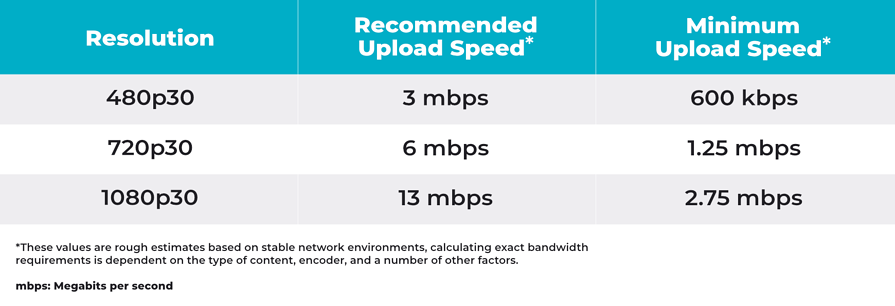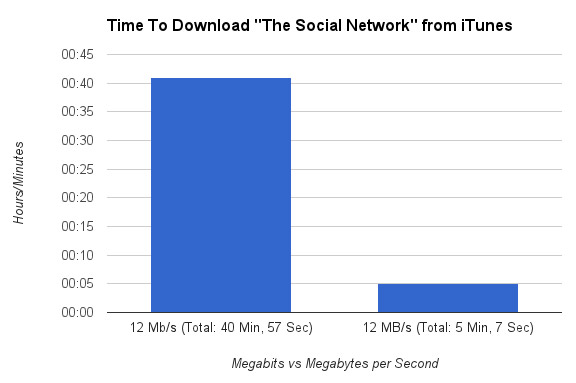A Comprehensive Overview to Measuring Megabits Per Second for Home Use
Wiki Article
Just How Megabits Per Second Influence Your Online Tasks
The idea of megabits per second (Mbps) plays a critical function in forming our on-line experiences. Greater Mbps can improve efficiency and lower disturbances, while insufficient rates may foster frustration and inadequacy.Recognizing Megabits Per Second
When thinking about web speed, it's important to recognize the idea of megabits per second (Mbps), which offers as a typical measurement for information transfer prices. This metric quantifies just how much information can be sent over a net connection in one second, offering a clear understanding of performance abilities - Megabits Per Second. For context, one megabit is equal to one million little bits, and Mbps is commonly used to reveal bandwidth for different on-line activitiesA greater Mbps indicates a faster internet link, allowing customers to perform tasks such as downloading and install files, surfing websites, and taking part in on the internet gaming extra efficiently. For example, common browsing needs around 1-5 Mbps, while streaming high-def video might demand 5-25 Mbps. Understanding these requirements is important for figuring out the proper internet speed required for certain tasks.
Additionally, the number of tools linked to a network can impact overall performance. Several customers streaming, pc gaming, or downloading and install simultaneously can strain available bandwidth, resulting in slower rates - Megabits Per Second. Reviewing individual online routines and demands is crucial in choosing a web strategy that straightens with one's requirements, making sure a seamless digital experience
Streaming and Buffering Issues
Streaming high-definition web content has actually come to be a staple of modern-day on-line amusement, yet it is usually come with by irritating buffering problems. These interruptions can dramatically take away from the viewing experience, resulting in frustration and prospective loss of target market involvement. Buffering happens when the data sent from the streaming service is not obtained swiftly enough to maintain a smooth playback, usually as a result of inadequate net rate measured in megabits per second (Mbps)
Additionally, real-time streaming can be impacted by network congestion, which takes place when numerous gadgets share the exact same data transfer. Consequently, optimizing link speed and ensuring ample Mbps is important for a seamless streaming experience. As streaming solutions remain to develop, understanding the influence of Mbps on buffering problems remains essential for consumers looking for uninterrupted entertainment.
Online Video Gaming Performance
The impact of net rate on online tasks expands past streaming, substantially affecting online pc gaming performance. In affordable video gaming, reduced latency and high data transfer are essential for a smooth experience. A fast link minimizes lag, permitting players to react swiftly to in-game occasions, which can be the difference between triumph and defeat.Data transfer, measured in megabits per second (Mbps), plays an essential role in supporting several tools and gaming systems simultaneously. Insufficient transmission capacity can result in went down links or reduced game top quality, adversely impacting gameplay. For circumstances, online multiplayer games need significant data transfer, especially review throughout peak pc gaming hours when numerous players are online.
Moreover, the kind of game can likewise dictate the needed internet speed. Hectic first-person shooters require greater rates to preserve responsiveness, while turn-based approach video games might operate moderately well on reduced rates. As on-line pc gaming remains to evolve, with increasing graphical fidelity and more complex multiplayer environments, the demand for greater Mbps will only magnify. Subsequently, gamers ought to guarantee they have adequate net rate to enhance their video gaming performance and general experience. Buying a robust internet connection is important click here to find out more for gamers looking to maximize their efficiency and satisfaction.
Video Conferencing Top Quality
In today's electronic landscape, video conferencing top quality is greatly affected by web speed, particularly in regards to transmission capacity and latency. Top notch video clip calls need sufficient transmission capacity to transmit sound and video information effortlessly. Usually, a minimum of 1.5 Mbps upload and download speeds is advised for common definition video clip, while high-definition video clip conferencing generally demands at least 3 Mbps.Latency, or the hold-up between sending and obtaining data, additionally plays an important function in the user experience. Reduced latency ensures that conversations circulation naturally without uncomfortable pauses or disruptions. Preferably, latency must be listed below 150 milliseconds for reliable interaction. Higher latency can cause resemble, lag, and disjointed communications, which can hinder partnership and involvement during meetings.
Furthermore, several individuals in a video clip meeting can strain readily available bandwidth, necessitating even higher speeds. Network blockage, usually created by simultaneous tasks like streaming or downloading, can additionally weaken video clip quality. Thus, for organizations counting on video conferencing for remote collaboration, comprehending the connection between megabits per second and general interaction top quality is essential for maintaining efficiency and improving online communications.
Choosing the Right Web Plan
Selecting a suitable internet plan is essential for making sure optimum performance in different online activities, especially in setups that require high data transfer, such as video conferencing and online video gaming. Megabits Per Second. When thinking about a web plan, it is necessary to evaluate both the rate and information allowance to match your particular usage needsFor houses with numerous individuals engaging in synchronised tasks, a plan providing higher megabits per second (Mbps) is suggested. Usually, a minimum of 25 Mbps is suitable for standard streaming and surfing, while plans going beyond 100 Mbps are more suitable for more intensive jobs. Furthermore, think about the nature of your online activities; video clip conferencing requires at the very least 1.5 Mbps publish speed, while on-line video gaming may require a lower latency yet constant link.
Limitless data strategies can prevent strangling and disturbances, particularly if hefty usage is anticipated. By attentively selecting an internet plan customized to your requirements, you can improve your on-line experience, making certain smooth, uninterrupted access to your preferred tasks.
Conclusion
Finally, the value of megabits per second Related Site (Mbps) fit on the internet tasks can not be overstated. Greater Mbps facilitates smooth streaming, minimizes buffering, improves pc gaming experiences, and makes certain top quality video conferencing. Conversely, inadequate bandwidth can lead to aggravating interruptions and decreased performance across various jobs. A detailed understanding of specific or family Mbps requirements is essential for picking a proper web strategy that sufficiently supports varied online activities and user needs.

Usually, a minimum of 25 Mbps is appropriate for typical streaming and browsing, while strategies surpassing 100 Mbps are more effective for more extensive jobs. Furthermore, take into consideration the nature of your online activities; video conferencing requires at least 1.5 Mbps post rate, while online pc gaming might require a reduced latency yet constant connection.
Report this wiki page